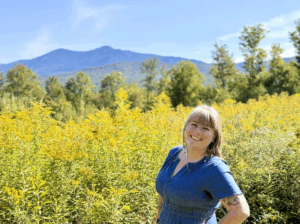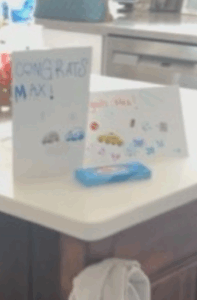
Nanny Stories
In honor of National Nanny Recognition Week (NNRW™), we are celebrating a few nannies on our roster by sharing their stories. Nannies play a crucial role in shaping the youth of today and supporting busy parents day in and day out. The contributions of nannies often go overlooked but so many of us could not tend to our jobs, obligations and aspirations without the unwavering support of excellent caretakers. We would like to thank every nanny who has dedicated their life to the betterment of children. You make the world a better place. Thank you.
Q&A with Hilary Adler, Nature Based Educator
We have a unique opportunity to make life changing connections with the children in our care. We can make a difference. What’s more meaningful than that?!
What does being a nanny mean to you, and what makes this work meaningful?
Being a nanny is a chance to make a positive life long impact. Whether it is helping a child build their self confidence, find their niche, or their voice. We have a unique opportunity to make life changing connections with the children in our care. We can make a difference. What’s more meaningful than that?!

What are some ways you keep yourself up to date with child development or other skill sets?
Childcare is ever evolving and as professional Nannies we should be as well. I truly believe we are never done learning. I try to take a few courses and gain new certifications every year. Another way to see what’s new in our field and learn from others in the industry is attending your local International Nanny Training Day. I’ve enjoyed going to this event as both an attendee and as speaker.
How has your role as a nanny changed over the years?
My role as a nanny has taken many forms. I have been a traditional M-F nanny, travel nanny, NCS, family assistant, and currently I am a Rota nanny. I have truly worked with all ages. From a few days old to those awkward teen years. That’s one of the reasons I love being a nanny. You have endless opportunities to change and grow alongside your career.
Q&A with Tina Barnes, Maryland Nanny
It’s meaningful work because nannies provide not just care, but a foundation of love, learning, and confidence that stays with children for life.
What does being a nanny mean to you, and what makes this work meaningful?
Being a nanny means having the privilege of shaping a child’s earliest experiences, it’s more than building blocks and finger painting- its teaching problem solving, fostering creativity and challenging kids to discover who they are. It’s meaningful work because nannies provide not just care, but a foundation of love, learning, and confidence that stays with children for life.

How do you build strong relationships with the children and families you work with?
Life as a nanny means showing up as your most authentic self because of how deeply personal the job is-you become part of a family and they become part of you. I believe nannies have such a wealth of both knowledge and love to give. Kids are engaged when you take an interest in what they are interested in. They’re also curious- so sharing your passions and introducing them to new experiences and ideas is essential. Building trust through open communication with parents, ensuring we work together as a united team is vital in creating consistency, security, and an environment where children can truly thrive.
How has your role as a nanny changed over the years?
My role as a nanny has evolved alongside the children I care for and from family to family. Over the years my role has shifted from meeting their basic needs, building routines, and nurturing their sense of safety and trust to fostering independence, supporting academic development, and encouraging social-emotional growth. The joy of long-term roles is getting to experience all these moments year to year from first days of preschool to senior prom. Life as a nanny during COVID was such a life-changing experience. Balancing limited social interaction, and new safety routines while still keeping the days engaging and comforting, as well as navigating remote learning for school aged kids deepened my adaptability and reinforced the importance of being both consistent and innovative in my care.
Q&A with Katie Beck, Twin Nanny
Be reliable and consistent and fun! Be flexible and learn how to read a room. See a need, fill a need and you will be totally fulfilled and successful!
What’s one misconception people often have about your work?
I think people tend to place nannies into one single category. Every single nanny family is different with varying personalities, careers and dynamics.
What advice would you give to someone just starting out as a nanny or thinking about entering the field?
Children should be your passion. Be reliable and consistent and fun! Be flexible and learn how to read a room. See a need, fill a need and you will be totally fulfilled and successful!
How has your role as a nanny changed over the years?
My career has evolved over the last decade from helping working parents make their lives run as smoothly as possible and take care of their children. Over time I have had other positions including being a tour nanny for a celebrity family and now I help manage homes and nanny for the rich and famous. I have cared for neurodivergent kiddos, 4 sets of twins and flown private. I am thankful for where my career has taken me and look forward to the future!
Q&A with Sonya Kumar, British Nanny, Maternity Nurse, Governess and Sleep Trainer
It’s disheartening to see how nannies are often perceived as uneducated individuals with an easy job, leading to mistreatment and a lack of respect. This stereotype overlooks the significant impact nannies have on children’s lives. In reality, they play a crucial role in shaping young minds, preparing them for the real world, and instilling essential life skills, manners, and etiquette.
What advice do you have for new nannies?
As you prepare to start your journey in nannying, here are some essential insights to keep in mind:
1. Understand the Role: Take the time to fully grasp what being a nanny entails. Ensure you’re comfortable with the responsibilities and can meet the family’s needs, including understanding the compensation package and expectations.
2. Be Adaptable: Every family is unique, so flexibility is crucial. Embrace the differences and be willing to adjust your approach to fit their specific dynamics.
3. Avoid Stubbornness: Recognise the distinction between offering advice and being controlling. It’s important to provide suggestions without overstepping boundaries.
4. Support Parental Involvement: If the parents express a desire to be actively involved, be open to their presence. Establishing a collaborative relationship can benefit everyone, especially the children.
5. Offer Gentle Guidance: Instead of telling parents how to raise their children, offer options and advice in a gentle manner. This fosters a respectful partnership.
6. Don’t Compete with Parents: Remember that you can never replace a parent. Focus on being a fun and caring presence in the child’s life, someone they can trust and enjoy spending time with.
By keeping these principles in mind, you’ll create a positive environment for both the children and the family you work with.
What are some ways you keep yourself up to date with child development or other skills?
Staying informed about child development and enhancing your skills can be effectively achieved through social media and online communities. Facebook hosts numerous groups where nannies and experts share valuable advice and experiences. Additionally, LinkedIn is an excellent platform for connecting with like-minded professionals; many private household staff members use it to network and exchange insights. There are also various social media channels featuring individuals who generously share their expertise. Furthermore, there are many apps available, often with affordable subscriptions or even free options, providing an incredible wealth of information and advice. Consider enrolling in courses that provide the latest information and guidelines—these can be both informative and enjoyable!
How do you think society views nannies, and what would you like to change about that perception?

It’s disheartening to see how nannies are often perceived as uneducated individuals with an easy job, leading to mistreatment and a lack of respect. This stereotype overlooks the significant impact nannies have on children’s lives. In reality, they play a crucial role in shaping young minds, preparing them for the real world, and instilling essential life skills, manners, and etiquette. I am a Cambridge university graduate, many Nannies have outstanding academic achievements and decided to use their knowledge to help further shape the children of the future.
Nannies are not just caregivers; they are educators, mentors, and emotional support figures for children. Their work is instrumental in helping children navigate social interactions, develop confidence, and feel secure in their environment. This nurturing role is anything but easy and requires a wealth of knowledge, patience, and skill.
Moreover, nannies can earn substantial salaries, with some reaching six figures, reflecting the value they bring to families. It’s essential to recognize and appreciate the hard work and dedication that nannies invest in their roles. They are molding the future by fostering happy, healthy, and well-rounded individuals who will thrive in society.
Instead of viewing nannies as lesser professionals, we should honour their contributions and recognise the vital part they play in the lives of the children they care for.
Q&A with Milan Puga, Career Nanny & Educator
I foster developmental growth, encourage curiosity, and support reaching milestones. It’s all about creating a safe, nurturing, and enriching environment where children can truly learn, thrive and feel loved along the way.
What’s one misconception people often have about your work?
A common misconception about my job as a career nanny, is that nannies are just babysitters who only ‘watch’ kids. In reality, my role goes far beyond supervision and ensuring they’re safe. With 10 years of experience working with children and degrees in early childhood education and child development, I bring an intentional, educational approach to my childcare. I foster developmental growth, encourage curiosity, and support reaching milestones. It’s all about creating a safe, nurturing, and enriching environment where children can truly learn, thrive and feel loved along the way. Choosing to be a career Nanny has been one of the decisions I made in my life.

What’s the most heartwarming thing a child has ever said or done for you?
It definitely has to be when they randomly tell me “I love you” accompanied by a hug or just saying it while we’re in the car or playing. Truly the best feeling.
What advice would you give to someone just starting out as a nanny or thinking about entering the field?
My advice would be that if you’re thinking about it, do it. The more experience you have behind you, the better. References are everything so when hired, whether it’s Babysitting or your first Nanny job, it’s important that you do your best job so that parents have wonderful things to share about you when wanting to move up in the Nanny ladder. Also, don’t be afraid to network and put yourself out there. Make a flyer for yourself advertising your services and post them in local Facebook groups, work with agencies once you get enough years of experience behind you, and grow your knowledge in the field whether it’s taking classes at a college in child development or obtaining certifications relating to childcare.
Q&A with Tina Selig, Career Nanny
Nannying is about more than keeping children safe—it’s about guiding them, supporting families, and being a steady, trusted presence in their lives. Over the years, I’ve learned to rely less on boundless energy and more on patience, intuition, and experience.
How has your role as a nanny changed over the years?
I began nannying at 18, full of energy and excitement to play, read stories, and care for children. Back then, I saw it as a job I loved. Now, at 51, I realize just how much my role has grown. Nannying is about more than keeping children safe—it’s about guiding them, supporting families, and being a steady, trusted presence in their lives.
Over the years, I’ve learned to rely less on boundless energy and more on patience, intuition, and experience. I’ve watched children grow from babies to young adults, and I’ve seen how small moments—comforting tears, sharing a laugh, teaching kindness—can have a lasting impact.
What began as a passion has truly become my life’s work. Every day I’m reminded of the joy, responsibility, and privilege of being part of a child’s life.
To fellow nannies: your work matters more than you know. To parents: thank you for trusting us with your greatest treasures.
How did you get started as a nanny?
My journey as a nanny began in my senior year of high school, caring for three energetic boys who lived on a beautiful lake. Our days were full of boating, golf, and endless laughter—it was a perfect introduction to the world of childcare.
During my first year of college in Boston, I worked for a nanny agency while pursuing a degree in Travel and Tourism. After graduation, I joined the second-largest travel agency in the United States, building a career in Boston. Everything was going well—until September 11th changed the travel industry overnight. The travel industry came to a standstill, uncertainty filled the air, and suddenly, what once felt like a secure career vanished. It was a moment that forced me to rethink my path and consider what truly mattered in life.
I returned to something I had always loved: caring for children. That decision turned into a full-time, lifelong career, and I haven’t looked back since. Nannying has been more than a job—it’s been a calling, a passion, and a privilege.
What’s the most heartwarming thing a child has ever said or done for you?

One moment that truly touched me happened just last year, when my son got his driver’s license. The very next day, I arrived at my nanny family’s home, and there on the kitchen island was a hand-written card signed by the boys, balloons, and even a gift card for gas—all for my son.
That gesture spoke volumes about the love and thoughtfulness of the family I work for. It reminded me in such a real and emotional way why nannying is more than a job—it’s about being part of a family’s life, sharing in their joys, and building connections that go both ways. Even now, thinking about what they did for my own child still brings tears to my eyes.

